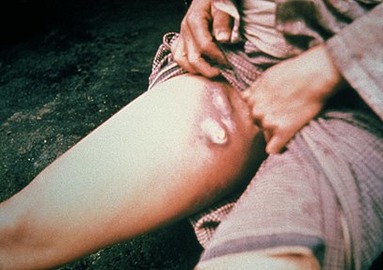
Bubonic plague
Bubonic plague is one of three types of plague caused by the bacterium Yersinia pestis. One to seven days after exposure to the bacteria, flu-like symptoms develop. These symptoms... Wikipedia
- Specialty: Infectious disease
- Symptoms: Fever, headaches, vomiting, swollen lymph nodes
- Usual onset: 1–7 days after exposure
- Causes: Yersinia pestis spread by fleas
- Diagnostic method: Finding the bacterium in the blood, sputum, or lymph nodes
- Treatment: Antibiotics such as streptomycin, gentamicin, or doxycycline
- Frequency: 650 cases reported a year
- Deaths: 10% mortality with treatment, 30–90% if untreated
- Data source: DuckDuckGo